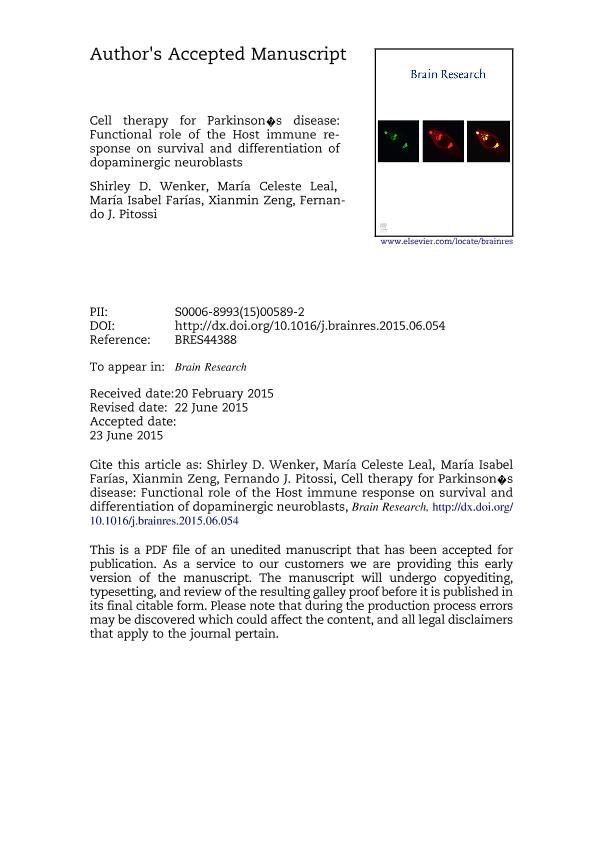Mostrar el registro sencillo del ítem
dc.contributor.author
Wenker, Shirley Denise

dc.contributor.author
Leal, Maria Celeste

dc.contributor.author
Farias, Maria Isabel

dc.contributor.author
Zeng, Xianmin
dc.contributor.author
Pitossi, Fernando Juan

dc.date.available
2017-09-15T19:58:22Z
dc.date.issued
2015-08
dc.identifier.citation
Wenker, Shirley Denise; Leal, Maria Celeste; Farias, Maria Isabel; Zeng, Xianmin; Pitossi, Fernando Juan; Cell therapy for Parkinson׳s disease: Functional role of the host immune response on survival and differentiation of dopaminergic neuroblasts; Elsevier Science; Brain Research; 1638; Part A; 8-2015; 15-29
dc.identifier.issn
0006-8993
dc.identifier.uri
http://hdl.handle.net/11336/24423
dc.description.abstract
Parkinson's disease (PD) is a neurodegenerative disorder, whose cardinal pathology is the loss of dopaminergic neurons in the substantia nigra. Current treatments for PD have side effects in the long term and do not halt disease progression or regenerate dopaminergic cell loss. Attempts to compensate neuronal cell loss by transplantation of dopamine-producing cells started more than 30 years ago, leading to several clinical trials. These trials showed safety and variable efficacy among patients. In addition to variability in efficacy, several patients developed graft-induced dyskinesia. Nevertheless, they have provided a proof of concept that motor symptoms could be improved by cell transplantation. Cell transplantation in the brain presents several immunological challenges. The adaptive immune response should be abolished to avoid graft rejection by the host. In addition, the innate immune response will always be present after transplanting cells into the brain. Remarkably, the innate immune response can have dramatic effects on the survival, differentiation and proliferation of the transplanted cells, but has been hardly investigated. In this review, we analyze data on the functional effects of signals from the innate immune system on dopaminergic differentiation, survival and proliferation. Then, we discussed efforts on cell transplantation in animal models and PD patients, highlighting the immune response and the immunomodulatory treatment strategies performed. The analysis of the available data lead us to conclude that the modulation of the innate immune response after transplantation can increase the success of future clinical trials in PD by enhancing cell differentiation and survival. This article is part of a Special Issue entitled SI: PSC and the brain.
dc.format
application/pdf
dc.language.iso
eng
dc.publisher
Elsevier Science

dc.rights
info:eu-repo/semantics/openAccess
dc.rights.uri
https://creativecommons.org/licenses/by-nc-nd/2.5/ar/
dc.subject
Cell Therapy
dc.subject
Dopaminergic Neuron
dc.subject
Immune Response
dc.subject
Parkinson Disease
dc.subject.classification
Bioquímica y Biología Molecular

dc.subject.classification
Ciencias Biológicas

dc.subject.classification
CIENCIAS NATURALES Y EXACTAS

dc.title
Cell therapy for Parkinson׳s disease: Functional role of the host immune response on survival and differentiation of dopaminergic neuroblasts
dc.type
info:eu-repo/semantics/article
dc.type
info:ar-repo/semantics/artículo
dc.type
info:eu-repo/semantics/publishedVersion
dc.date.updated
2017-09-08T20:07:22Z
dc.identifier.eissn
1872-6240
dc.journal.volume
1638
dc.journal.number
Part A
dc.journal.pagination
15-29
dc.journal.pais
Países Bajos

dc.journal.ciudad
Amsterdam
dc.description.fil
Fil: Wenker, Shirley Denise. Consejo Nacional de Investigaciones Científicas y Técnicas. Oficina de Coordinación Administrativa Parque Centenario. Instituto de Investigaciones Bioquímicas de Buenos Aires. Fundación Instituto Leloir. Instituto de Investigaciones Bioquímicas de Buenos Aires; Argentina
dc.description.fil
Fil: Leal, Maria Celeste. Consejo Nacional de Investigaciones Científicas y Técnicas. Oficina de Coordinación Administrativa Parque Centenario. Instituto de Investigaciones Bioquímicas de Buenos Aires. Fundación Instituto Leloir. Instituto de Investigaciones Bioquímicas de Buenos Aires; Argentina
dc.description.fil
Fil: Farias, Maria Isabel. Consejo Nacional de Investigaciones Científicas y Técnicas. Oficina de Coordinación Administrativa Parque Centenario. Instituto de Investigaciones Bioquímicas de Buenos Aires. Fundación Instituto Leloir. Instituto de Investigaciones Bioquímicas de Buenos Aires; Argentina
dc.description.fil
Fil: Zeng, Xianmin. Buck Institute for Research on Aging; Estados Unidos
dc.description.fil
Fil: Pitossi, Fernando Juan. Consejo Nacional de Investigaciones Científicas y Técnicas. Oficina de Coordinación Administrativa Parque Centenario. Instituto de Investigaciones Bioquímicas de Buenos Aires. Fundación Instituto Leloir. Instituto de Investigaciones Bioquímicas de Buenos Aires; Argentina
dc.journal.title
Brain Research

dc.relation.alternativeid
info:eu-repo/semantics/altIdentifier/url/http://www.sciencedirect.com/science/article/pii/S0006899315005892
dc.relation.alternativeid
info:eu-repo/semantics/altIdentifier/doi/https://doi.org/10.1016/j.brainres.2015.06.054
Archivos asociados
